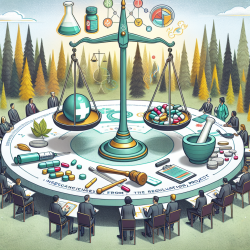Introduction
The mental health and psychosocial challenges faced by children in conflict-affected regions like Kachin State, Myanmar, are profound. The research article "Mental health and psychosocial problems among conflict-affected children in Kachin State, Myanmar: a qualitative study" sheds light on these challenges and offers valuable insights for practitioners aiming to enhance therapeutic outcomes for children.
Key Findings
The study identifies four primary psychosocial issues affecting children in Kachin State:
- Behavior Problems: Including arguing, stealing, and bullying, often linked to financial stressors and environmental influences.
- Substance Use: Involving methamphetamine, tobacco, and alcohol, driven by peer influence and lack of supervision.
- Effects of War: Encompassing economic hardship, food insecurity, and family separation, leading to trauma and distress.
- Emotional Distress: Feelings of sadness, depression, and hopelessness, exacerbated by displacement and exposure to violence.
Implications for Practitioners
For practitioners, understanding these interconnected issues is crucial for developing effective interventions. The study emphasizes the importance of addressing both trauma and ongoing stressors to improve mental health outcomes. Here are some strategies practitioners can consider:
- Transdiagnostic Approaches: Implement interventions like the Common Elements Treatment Approach (CETA) that address a range of issues, including depression, anxiety, and trauma.
- Community Engagement: Leverage community resources, such as religious and camp leaders, to provide support and encourage positive coping mechanisms.
- Parental Involvement: Educate and involve parents in the therapeutic process to enhance support for children and address behavior problems effectively.
Encouraging Further Research
While the study provides a foundational understanding, there is a need for further research to explore the prevalence and nuances of these issues across different contexts. Practitioners are encouraged to contribute to this growing body of knowledge by conducting studies in their regions and sharing findings with the broader community.
Conclusion
By integrating the insights from this study into practice, therapists can make data-driven decisions that significantly improve outcomes for children affected by conflict. Understanding the complex interplay of trauma and daily stressors allows for more comprehensive and effective interventions.
To read the original research paper, please follow this link: Mental health and psychosocial problems among conflict-affected children in Kachin State, Myanmar: a qualitative study.










